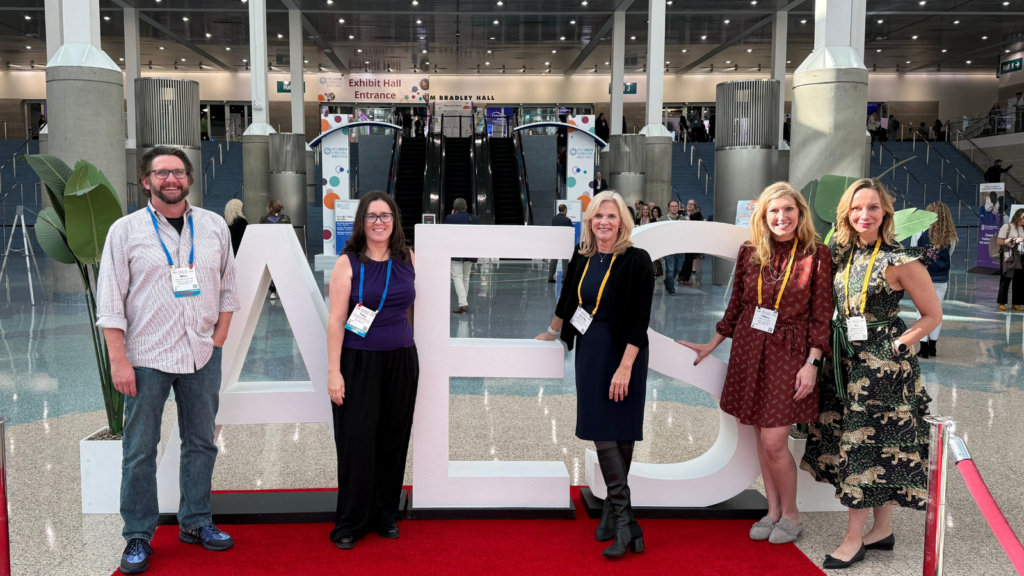 Hope Abounds as Lennox-Gastaut Syndrome (LGS) Research Took Center Stage at the 2024 American Epilepsy Society Meeting
Hope Abounds as Lennox-Gastaut Syndrome (LGS) Research Took Center Stage at the 2024 American Epilepsy Society Meeting
Increased awareness and research positioned LGS as a major area of interest at this year’s AES Annual Meeting. LGS was highlighted as more than 5,000 international experts gathered to discuss recent advancements and research efforts surrounding this rare and severe form of epilepsy.
Major highlights include:
- Shining a spotlight on seizures, comorbidities, and caregiver needs in Adults with LGS
- Debating whether we should treat the cause of the seizures (e.g. the gene, structural cause, etc.) or the abnormal EEG brain waves in LGS (the answer is both!)
- Expanding access to new therapies for patients with LGS and other Developmental and Epileptic Encephalopathies (DEE) through unique clinical trial design
- Mobilizing a new era of treatment and prevention in LGS (yes, PREVENTION!)
One of the key areas of focus at the AES Meeting was the latest developments in drug therapies. Researchers presented promising findings on novel treatments, including medications that target novel brain mechanisms, Deep Brain Stimulation (DBS), Responsive Neurostimulation (RNS), Transcranial Magnetic Stimulation (TMS), gene therapy, stem cell therapy, and others. These new treatments are being designed to address the complex and debilitating symptoms of LGS. Several anti-seizure medications and neuromodulatory devices are currently undergoing clinical trials in LGS, showing the potential to reduce seizure frequency and improve the quality of life for patients.
In addition, discussions highlighted the importance of early diagnosis and intervention. Experts emphasized that while LGS is notoriously difficult to treat, early identification and tailored therapies can significantly impact long-term outcomes. In a major win for LGS advocates and researchers, the first talk of its kind on identifying the evolution of LGS in young children so that it may be prevented was held with much interest. Research is now underway to identify biomarkers that may lead to prevention trials.
The meeting also underscored the need for increased research funding and collaboration to uncover more effective treatments. With the support of the epilepsy community, there’s hope that breakthroughs in understanding and managing LGS could significantly improve the lives of those affected by this challenging condition.
Highlighting LGS on the main stage at this important meeting is a major advancement for LGS research as LGS has been treated the same way for more than 40 years. We give anti-seizure treatments alone or in combination with others, and we hope they work. However, in LGS, individuals continue to have seizures despite treatment. Researchers highlighting these new advances, many of which have been supported by the LGS Foundation, mark a major milestone in bringing about cures for LGS.
In even more exciting news, the LGS Foundation will launch Phase 2 of the LGS Learn from Every Patient Database in early 2025. Phase 2, called the Our LGS Life Study, is a natural history study that will enable patient-centered rare disease research where scientists and physicians can learn from every LGS patient. This research aims to improve living with LGS for patients and their families.
Over the last 15 years, the LGS Foundation has invested over $1.8 million in research. The Cure LGS 365 Research Grant program has funded 16 research projects in multiple countries. The Foundation’s priority areas for 2025 are to advance critical research in sleep, expressive communication, and the evolution of the EEG from early-life seizures to LGS. Our newest project, the LGS Learn From Every Patient Database, is a multi-year, multi-stakeholder effort to bring the patient and caregiver voice to doctors, researchers, regulators, policymakers, and most importantly, other patients and caregivers. It’s time we found the cures for this devastating epilepsy syndrome.
Thank you for supporting these incredible advancements in LGS research. We could not have done it without you. – Tracy Dixon-Salazar, PhD
Updated 01/19/25 (KK)
